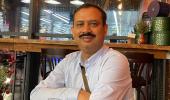Exhausted but elated, around 600 Indian students, who waged a tough battle for survival before being pulled out of war-battered Ukrainian city of Sumy, are now on way to Poland on a train from where they will be flown back home likely on Thursday.

Indian envoy to Ukraine Partha Satpathy flagged off the special train at Lviv railway station, with its war-weary passengers smiling broadly, flashing the victory sign and shouting 'Bharat Mata Ki Jai'.
'Ambassador flags off special train with 600 Indian students from Sumy University at Lviv Railway Station. They will travel to Poland and are expected to board evacuation flights to India tomorrow. Be Safe Be Strong,' the Indian embassy in Ukraine tweeted.
'Indian students from Sumy on board the special train organised with assistance of Ukranian authorities. Mission will continue to facilitate their movement westwards. Bringing back our students safely and securely will remain our priority,' it said.
Lviv is a city in western Ukraine, around 70 km from the border with Poland.
India is set to have the last evacuation flight under 'Operation Ganga', the evacuation mission that was launched on February 26 in the wake of the war in Ukraine.
More that 17,100 Indian nationals fleeing the war in Ukraine were evacuated from Romania, Poland, Hungary, Slovakia and Moldova after they crossed over to these countries.
Tricolour in hand and chant of 'Bharat Mata Ki Jai' on lips, these students who fought a doughty battle in bomb shelters and basements of their hostels in frigid weather, low on food, drinking water and other essential supplies, as Russian forces clobbered the city with rockets and heavy gunfire, had a reason to cheer after a seemingly endless wait for rescue.
Covering hundreds of miles across Ukraine, using multiple means of transport, they are being evacuated from the war-hit east European country after two weeks of beleagured existence when their lives were on the line.
The operation in Sumy began on Tuesday morning when the last big group of 600 Indians was evacuated from the city.
The Indian nationals were taken from Sumy in a convoy of 13 buses escorted by the International Committee of the Red Cross (ICRC) to Poltava, Anshad Ali, a student coordinator, said.
It was a second attempt at evacuating them from Sumy, after the first came a cropper as a humanitarian corridor out of the city could not be created because the ceasefire announced by the Russians failed to take hold on Monday.
Jisna Jiji, a 25-year-old medical student who spoke to PTI from the train to Lviv, said all of them are relieved to have come out of Sumy.
"We are tired but happy. We are travelling since Tuesday morning and have to travel for several more hours but now we have hope that we will reach home safely," she said.
Ali, who spoke to PTI from Poltava, said the group also included a handful of Bangladeshi and Nepalese nationals.
"After the Indian students, the students of other countries were also evacuated. Around 95 per cent of the students have been evacuated from Sumy," Ali said.
The first attempt to evacuate them was made on March 7 after the distressed students put out a video, declaring they have decided to undertake a journey on foot to reach the Russian border, raising fears about their safety back home in India.
The government stepped in and persuaded them to stay back in Sumy while attempts were being made for their safe evacuation.
Prime Minister Narendra Modi called up Russian President Vladimir Putin and Ukrainian leader Volodymyr Zelenskyy to discuss ways to facilitate their evacuation.
The video swamped social media platforms and forced the global community to sit up and take notice of their hardship.
Using social media as a weapon in the war that unfolded inexorably with greater ferocity each passing day, these students flooded various platforms with videos and photos highlighting their abysmal condition.
"We were requesting authorities to evacuate us as soon as possible as our resources started depleting and there was continuous shelling, but the requests fell on deaf ears. Frustrated by no response, we decided to post a video on social media. It went viral and within hours we got a response from the government and now we are being evacuated," Jisna said.
Their sustained social media campaign ensured they were not forgotten in the mayhem of the war.
Medical student Aousaf Hussain, 25, a native of Kerala, who was stuck in a bunker with his friends, said, "When the war started, there was no one to help us. So we started to record the videos so that the people who saw those could help us. It was as if we were forgotten. Nobody was asking about us."
Their country did not forget them and they will perhaps not forget the war, the worst in Europe since World War II, as they ruminate about the times when they were living on the edge, scrounging for food and water, on their journey back home.











 © 2025
© 2025